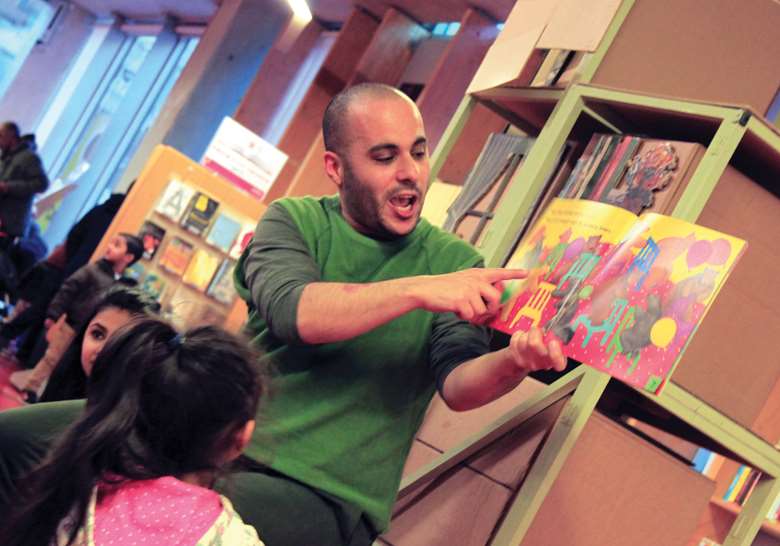Behind the Inspection Rating: Storytelling brings families closer
Tristan Donovan
Monday, September 1, 2014
Booktrust's Stories Tour wins Ofsted's praise for helping fathers reconnect with their children.

Booktrust Stories Tour, nationwide | Ofsted good practice example | June 2014.
"It made myself and my children and partner feel like a real family again."
For the reading charity Booktrust, this father's comment was exactly the kind of experience it hoped to deliver when it took its Stories Tour project into prisons in England and Wales.
The tour was primarily about encouraging reading in Pakistani, Bangladeshi and Somali families through events held in libraries and community centres, but the charity also wanted it to help imprisoned dads maintain their family ties by reconnecting with their children via storytelling.
Taking the project behind bars was "a huge learning curve" says Justine Hodgkinson, the strategic lead for the Stories Tour, which Ofsted recently highlighted as an example of good practice.
While Booktrust had worked with families in prison before, its efforts were limited to informal sessions in the visitor centres. The Stories Tour was an altogether more ambitious project involving a morning workshop for prisoners, a stage show performed by actors and an afternoon of storytelling for the inmates and their families.
To make it happen Booktrust needed access to prisons and permission to construct a temporary stage within the institutions. It also needed to adapt its project to meet the restrictions of prison.
And that's where Pact, the charity for families affected by imprisonment, came in. "It made really good sense to partner with Pact because they work within prison settings," says Hodgkinson.
Multiple changes were required. The project's staff and actors needed enhanced criminal record checks and the equipment used needed to be re-examined. Items like Blu Tack, which could be used to make casts of locks, had to go.
The short children's story written for the tour also needed rechecking for the prison environment. For example, in one part of the story, which tells of a girl who unfreezes time by learning to love stories, a key was mentioned.
"It was about thinking that when these guys were not with their families they are locked up, so it's about the sensitivities," says Hodgkinson.
Having cleared the hurdles, the charities took the Stories Tour into eight adult male prisons, where they held 17 sessions in total.
Each session began with a morning workshop where prisoners were introduced to the story and taught how they could make the event special for their children.
In the afternoon the event moved to the visitor centres where families got to play and read stories with their children. Finally, the fathers gave their children personalised gift bags with copies of the books that they had been reading to take home.
From the prisoners' feedback the sessions seem to have made a big difference to the families. "I really enjoyed it. So did the kids, they loved it," said one. "They never really saw it as a prison or saw me as a prisoner."
"Some of the prisoners have said that the books they gave their children are now their children's favourite books because it reminds them of that time they spent with their daddy in the afternoon session," says Hodgkinson. "What we hope is that storytelling and access to books is now something that the families are thinking more about now."
FACT FILE
- Name: Booktrust Stories Tour
- Location: England and Wales
- Description: Reading charity Booktrust's Stories Tour was an Arts Council England-funded "literature show" designed to get families - particularly Bangladeshi, Pakistani and Somali families - reading to their children. While most of the tour took place in libraries and community centres, Booktrust also brought it to eight prisons for adult men to help imprisoned fathers connect with their children through storytelling and reading.
- Number of children: 242 children participated in the prisons version of the tour
HELPFUL HINTS
Find an expert partner. To help bring the Stories Tour to prisons, Booktrust teamed up with Pact, a charity that works with prisoners and their families. "What was key was identifying who the experts were within prison work," says Justine Hodgkinson, strategic lead for the Stories Tour project. "Pact's expertise was invaluable - they steered us through all the complexities of working in prisons."
Involve prison officers. "It's a big step outside their comfort zone in many ways so we made sure the prison staff were included in the process," says Hodgkinson. "We trained staff on the importance of storytelling and working with families and how it could help maintain family ties so that they could see it was contributing to something much bigger than a storytelling event."
Make it special. After promoting the event with posters in the prisons to attract prisoners to take part, Booktrust and Pact sent the inmates' families formal invitations to the event. "When it comes to the family it's important to make it special and make them feel excited about going to what can be a very daunting place," says Hodgkinson.




